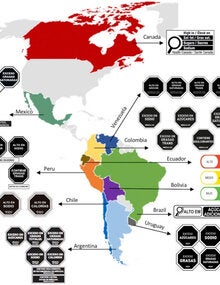Poor nutrition is one of the leading causes of non-communicable diseases (NCDs), especially in the WHO Region of the Americas (AMRO). In response, international organisations recommend front-of-pack nutrition labelling (FOPNL) systems that present nutrition information clearly to help consumers make healthier choices. In AMRO, all 35 countries have discussed FOPNL, 30 countries have formally introduced FOPNL, eleven have adopted FOPNL, and seven countries (Argentina, Chile, Ecuador, Mexico, Peru, Uruguay and Venezuela) have implemented FOPNL. FOPNL has gradually spread and evolved to better protect health by increasingly adopting larger warning labels, contrasting background devices for better salience, using “excess” instead of “high in” to improve efficacy, and adopting the Pan American Health Organization's (PAHO) Nutrient Profile Model to better define nutrient thresholds. Early evidence illustrates successful compliance, decreased purchases and product reformulation. Governments still discussing and waiting to implement FOPNL should follow these best practices to help reduce poor nutrition related NCDs.
|

